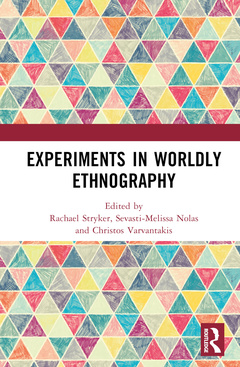Description
Experiments in Worldly Ethnography
Language: English
Subjects for Experiments in Worldly Ethnography:
Keywords
· 15.6x23.4 cm · Hardback
Description
/li>Contents
/li>Readership
/li>Biography
/li>
1 Ethnography at the worldly edge
Sevasti-Melissa Nolas, Rachael Stryker, and Christos Varvantakis
2 Biopedagogy and school-based social reform via Waldorf (Steiner) education: the ethnographic importance of paradox
Elisa J. Sobo
3 Ethnographer, interrupted: revisitation as worldly ethnography
Rachael Stryker
4 Minting worlds: economic minors tracing money in a 'Global' Financial Crisis
Sevasti-Melissa Nolas, Christos Varvantakis, and Vinnarasan Aruldoss
5 Data ethnography: doing multimodal ethnography in a data and AI-driven world
Veronica Barassi
6 Ethnographic filmmaking for understanding peacebuilding: a multisited and multimodal approach
Colleen Alena O’Brien
7 The affective resonance of violent acts: doing ethnography on a risky planet
Joshua McNamara
8 A translocal ethnography with survivors of human trafficking: a sensorial, hyperlink cinema narrative
runa lazzarino
9 The poetics of resonance: worldly ethnography as empathic and aesthetic attendance
Simone Toji
10 The seeing body and the feeling eye.
Michele A. Feder-Nadoff
11 Looking for the margin: an ethnography of gradualness
Jasamin Kashanipour
Sevasti-Melissa Nolas is a visual sociologist who teaches at Goldsmiths, University of London. She is known for her research on childhood publics, children’s visual cultures, children’s archives, multimodal ethnography, and publics creating methodologies. She co-founded and directsThe Children’s Photography Archive. She also co-founded and co-edited the journal Entanglements: Experiments in Multimodal Ethnography (2018–2022).
Rachael Stryker is Professor of Human Development and Women's Studies at California State University, East Bay. She is the author of The Road to Evergreen: Adoption, Attachment Therapy and the Promise of Family (2010) as well as many articles on the biomedicalisation of attachment and adoptee experience in the US.
Christos Varvantakis is a social anthropologist whose work focuses on political activism, archives, the commons, and the cultural sector. He is a Partnerships Manager at Wikimedia Deutschland where he is responsible for onboarding global cultural organisations to the Linked Open Data web. He loves working with socially minded people and organisations on issues relating to opening, diversifying, decolonising and democratising knowledge.
These books may interest you

Ethnography 47.73 €



